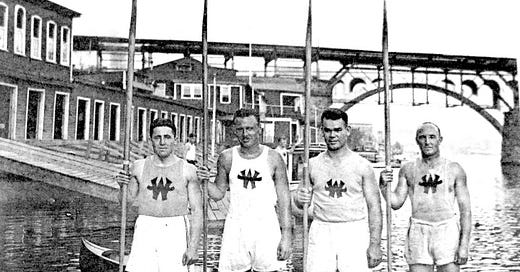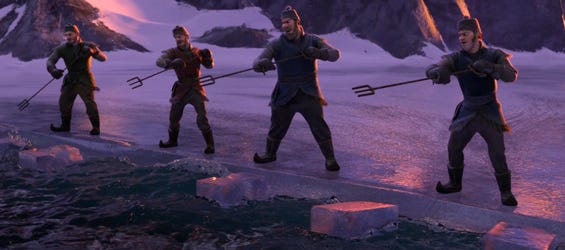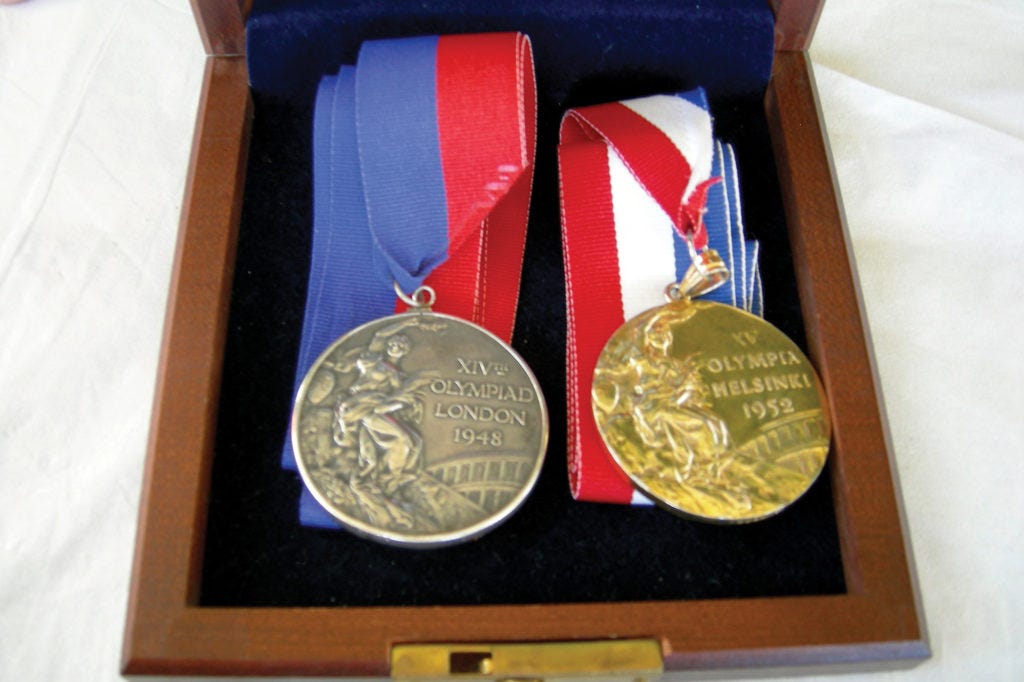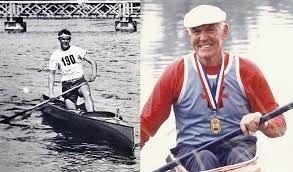Paris Olympics 2024 is just a month away and the excitement of the Olympics season is beginning to show on my face. I have warned my family that I may be a little groggy and keep misplacing my spectacles on the 27th of July. They know that I will be staying up till past midnight to watch the opening ceremony on TV (mark the date - 26th July). For the first time ever, the opening ceremony of this Summer Olympics will be hosted OUTSIDE of a stadium. 10,000 athletes from different countries will be getting onto boats in the River Seine, the skies will be lit with fireworks and it will have many grand music performances.
AI prompt ‘The riverside of Paris with boats, balloons and fireworks. The time is past sunset’
Did you know -
that in every Olympics opening ceremony parade, it is traditional for the Greeks to lead the way?
that the last group in the parade will be from the hosting country?
that Paris hosted the Olympics 100 years ago, in 1924?
Onto today’s story - when a new sport was added a hundred years ago
Canoe racing (canoes are a kind of a boat) was added to the Olympics’ list of sports in 1924. Two brothers who were selected for the US national team for canoe racing were Bill and Bud Havens. In their childhood, they helped their father harvest large chunks of ice from the neighbouring lakes. They would haul 300-pound blocks of ice to their icehouse in Virginia. From there, they delivered it to customers with icebox refrigerators.
What’s an icebox refrigerator? In the 1800s and early 1900s, before refrigerators running on electricity became common, the Americans used icebox refrigerators. This was a giant box made of wood with a tin or zinc lining. A large block of ice would sit on top of the wooden box and keep the food stored inside it cold and unspoilt. If you’ve heard your grandmother or great-grandmother call the refrigerator an icebox, now you know the origin of that word.
Bill and Bud developed powerful muscles thanks to the daily hauling of ice-blocks. As young teens, they often swam in the neighbourhood rivers and paddled canoes and kayaks. By the 1920s, they were among the fastest paddlers in the world. When the Olympics Committee announced that canoe-racing would be included in the 1924 Games, the US national selection committee held a selection race. Both Bud and Bill made it to the top ranks. They trained throughout the cold spring of 1924.
When it was time to leave for Paris for the Olympics Games, Bill was facing a dilemma. His wife was pregnant and she was very likely to give birth to their child about the same time that his team would be competing in the Olympics. There were no commercial airplanes in 1924. So Bill couldn’t fly home immediately after the games. There were ships, but Bill would have taken a long time to get home on a ship. He wasn’t sure if he wanted to risk not being at his wife’s side when the baby was born (in those days, medical complications during childbirth were common). Bill was torn between having to choose the Olympics and staying at home.
His wife insisted that he go to Paris. Participating in the Olympics was one of Bill’s lifelong dream. He had worked really hard and trained for this. Yet, after much soul searching, he decided to withdraw and be at home, where he could support his wife when the child arrived.
The US team (incl. his brother Bud) sailed onto France and Bill waved them the best from the dockside. The US team won the gold medal. Ironically, Bill’s wife was late in giving birth. She was so late, that Bill could have competed in the Games, won the gold medal and returned in time to be with her when she gave birth. But Bill always maintained that he had no regrets.
Bill Havens went on to join the US canoeing team in subsequent Olympics, but the US team never won gold. Bill retired from canoeing a few years later.
The happy ending
The child born to Bill and his wife was a boy. They named him Frank. Like his father and uncle, Frank also took up canoeing from young. As much as he wanted to participate in the Olympics in the 1940s, Frank opted to join the US army to fight in the Second World War. The war ended, Frank came home and resumed his training in canoeing. He was selected for the Olympics Games in 1948. He won a silver medal but wasn’t satisfied. In the next Olympics held in Finland in 1952, Frank was selected to participate in a 10,000 m canoeing race. One morning, when Frank was practicing in Finland ahead of his race, all three paddles that he had brought from home, broke. Frank ran to a man who was standing nearby and asked if he could borrow a paddle. That man turned out to be the Canadian team’s coach and seeing the boy’s urgent need, he gave him his personal paddle which was in excellent shape (knowing fully well that Frank was competing with the Canadians in the Olympics).
After the Olympics, Frank sent his father a telegram
““Dear Dad, thanks for waiting around for me to get born in 1924. I’m coming home with the gold medal you should have won. Your loving son, Frank.”
Frank also created a world record in that 10,000 metre race (57:41-minute time).
“When I won, a teammate carried me on his shoulders while I waved the American flag. On the medal stand, I cried when I heard the national anthem and I thought of my father’s sacrifice for me.”
Frank Havens fought against some odds and also gained from some good luck. Someone else from Indian history who fought against giant hurdles in life and gained from luck - was a queen who ruled the Mughal empire. Nur Jahan was married to the Mughal emperor Jahangir, who liked his alcohol more than attending to court matters. She stepped into his shoes and presided over the durbar 👑 She issued imperial decrees, had coins minted in her name and shaped the foreign and economic policies of the empire.
But her incredible power and intelligence posed a serious threat to the heir in line. Soon after Jahangir’s death, afraid that Nur Jahan’s influence would sway his army and nobles in her favour, he sent her far away into exile. He removed all traces of her rule - thanks to which we know more about the men of the Mughal empire, but not about her.
Our new podcast episode this week about Nur Jahan is played through a game - ‘2 Truths and a Lie’. As a teaser, here are the three statements I gave in the first part of this episode. Find out which of them is the lie.
(A) Nur Jahan was born in a palace.
(B) It was unusual for girls to be educated, but her parents taught her to read and write.
(C) She was born outside of Agra, which was the capital of the Mughal empire.
Have you guessed which one of them is the Lie vs. which two of them are True? Check your answer by listening to the episode
Interesting stuff
a) Video: How people kept stuff cold before refrigerators
b) Video: Watch the 1000m Canoe Race in the Tokyo Olympics (2020)








